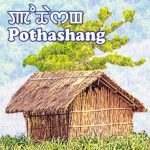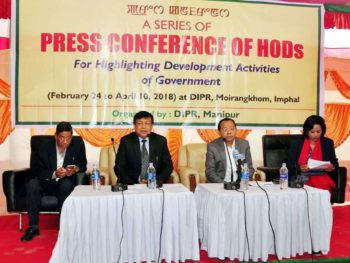Imphal, February 24, 2018 (DIPR): Organic food produce has become popular among the masses due to the advantages ranging from health benefits to environmental rewards. Director Horticulture and Soil Conservation Shri K. Kipgen was speaking during the inauguration of the 2-Day Media Seminar on Promotion of Organic Product and Value Chain Marketing” at the Hotel Classic organised by Editor’s Guild Manipur under the sponsorship of Department of Horticulture & Soil Conservation, Manipur.
Shri K. Kipgen said in the present scenario, popularity of the term ‘Organic’ is due to the awareness and health consciousness by the people. The food taken directly shapes the health for all, and in Manipur the horticultural crops are one of the basic food items. He said media plays an important role in highlighting the importance and spreading awareness among the masses. He also urged the media to report elaborately on the implementation, progress and process of “Mission Organic Value Chain Development for North Eastern Region (MOVCD-NER)” schemes in the State. Information on the process to obtain certification of the organic products is a must to make the scheme successful, he added.
Directorate of Information & Public Relations, Director, Shri Meghachandra Kongbam said that the Media Seminar is a step forward taken up by both the media and the Government Departments for the welfare of the people so that the schemes reach the targeted beneficiaries. Media must play a major role to help create awareness for successful implementation of the schemes and programmes.
In the technical session of the Media Seminar, Project Officer, Manipur Organic Mission Agency (MOMA), Dr. L. Jeebit Singh said Manipur being an agrarian state, 60% (sixty percent) of its population are engaged in agriculture sector. Keeping in mind the increasing population in the State, organic farming is an answer for sustainable agriculture practise, he added.
Speaking on the usage of chemical pesticides and fertilizers, Dr. L. Jeebit Singh said hill region of Manipur has low fertiliser usage at 11% and 89% in the valley (per hectare 135kg/ha fertiliser consumption). He also highlighted that in hills chemical fertilizers are mainly used for illegal plantation mainly in marijuana and poppy plantation. He also said that Organic Carbon is the most essential element in organic farming and in Manipur all farm areas have recorded 1.5% organic carbon presence indicating high sustainability in organic farming.
He highlighted that two schemes are being taken up by the state Government to develop organic farming i.e., Mission Organic Value Chain Development for North Eastern Region (MOVCD-NER) sponsored 100% by centre for the North East region with a vision to make ‘Organic Hub’ and the Paramparagat Krishi Vikas Yojna (PKVY).
The MOVCD-NER is a Central Sector Scheme of the Union Ministry of Agriculture and Farmers Welfare. In Manipur the scheme is implemented by Manipur Organic Mission Agency (MOMA), under the aegis of Department of Horticulture & Soil Conservation, Manipur.
The scheme is implemented by Manipur Organic Mission Agency (MOMA) with four service providers – Green Foundation, the Triple H, Garden Care, and Aromatic Medicinal Plants and Socio Economic Development Society. The crops include Tamenglong Orange, Kachai Lemon, Pineapple, King Chilli, Ginger, Turmeric and Chakhao (Black Aromatic Rice).
Dr. L. Ibomcha Singh, Regional Manager OneCert Asia Pvt. Ltd. said that farmers must acquire certificate or get certified by a National Organic Program (NOP) accredited agent to export organic products. APEDA (Agricultural and processed food products export development authority) laid down the guidelines with display of ‘India Organic’ logo for customer to easily identify certified products. Every country has its own standard of certificate regulation which must be fulfilled by a farmer or service provider to be able to export the products.
Manipur has the potential to become an organic State however the biggest challenge is sensitizing farmers, who are already using chemical fertilizers in farming. Compulsory post harvesting infrastructure and road transport can escalate agri-horti production of the State.
Journalist from both the print and electronic media participated in the seminar.












